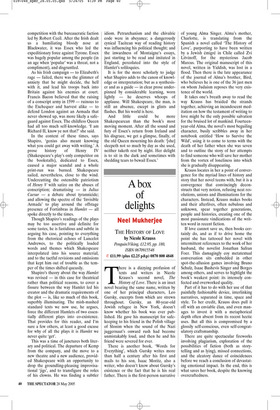A box of delights
Neel Mukherjee
THE HISTORY OF LOVE by Nicole Krauss Penguin/Viking, £12.95, pp. 180, ISBN 0670915548 ✆ £11.99 (plus £2.25 p&p) 0870 800 4848 There is a dizzying profusion of texts and writers in Nicole Krauss’s second novel, The History of Love. There is an inset novel bearing the same name, written by one of her principal characters, Leo Gursky, excerpts from which are strewn throughout. Gursky, an 80-year-old Jewish refugee in New York, doesn’t know whether his book was ever published. He gave his manuscript for safekeeping to his friend in the Polish village of Slonim when the sound of the Nazi juggernaut’s onward rush had become unmistakably loud, and then he and his friend were severed for ever.
There is another book, ‘Words for Everything’, which Gursky writes more than half a century after his first and mails to his son, Isaac Moritz, also a writer, who doesn’t know about Gursky’s existence or the fact that he is his real father. There is the first-person narrative of young Alma Singer. Alma’s mother, Charlotte, is translating from the Spanish a novel called ‘The History of Love’, purporting to have been written by a Jewish émigré in Chile called Zvi Litvinoff, for the mysterious Jacob Marcus. The original manuscript of this novel, written in Yiddish, was lost in a flood. Then there is the late appearance of the journal of Alma’s brother, Bird, who believes he is one of the 36 just men on whom Judaism reposes the very existence of the world.
It takes one’s breath away to read the way Krauss has braided the strands together, achieving an incandescent meditation on how the testament of writing to love might be the only possible salvation for the bruised lot of mankind. Fourteenyear-old Alma, the novel’s most beguiling character, busily scribbles away in her notebook entitled ‘How to Survive the Wild’, using it to come to terms with the death of her father when she was seven and to outline the story of her attempts to find someone who will save her mother from the vortex of loneliness into which she is gradually disappearing.
Krauss locates in her a point of convergence for the myriad lines of history and story that her novel teems with, but it is a convergence that convincingly deconstructs that very notion, refusing neat resolutions, unions and illuminations for the characters. Instead, Krauss makes books and their afterlives, often nebulous and unknown, spear together generations, people and histories, creating one of the most passionate vindications of the written word in recent fiction.
If love cannot save us, then books certainly do, and as if to drive home the point she has tattooed her novel with intermittent references to the work of her husband, the novelist Jonathan Safran Foer. This damagingly coy metatextual conversation sits embedded in other spot-the-allusion games involving Bruno Schulz, Isaac Bashevis Singer and Borges among others, and serves to highlight the book’s weakest point: its intensely confected and overworked quality.
Part of it has to do with her use of that painfully fashionable device, interlinking narratives, separated in time, space and style. To her credit, Krauss does pull it off with an enviable élan, and even manages to invest it with a metaphorical depth often absent from its recent hectic uses. But all this is compromised by a glossily self-conscious, even self-congratulatory craftsmanship.
There are quite spectacular fireworks involving plagiarism, exploration of the possibilities of fiction (both as storytelling and as lying), missed connections, and the aleatory dance of coincidences before we reach a conclusion of devastating emotional impact. In the end, this is what saves her book, despite the knowing overcraftedness.






















































 Previous page
Previous page